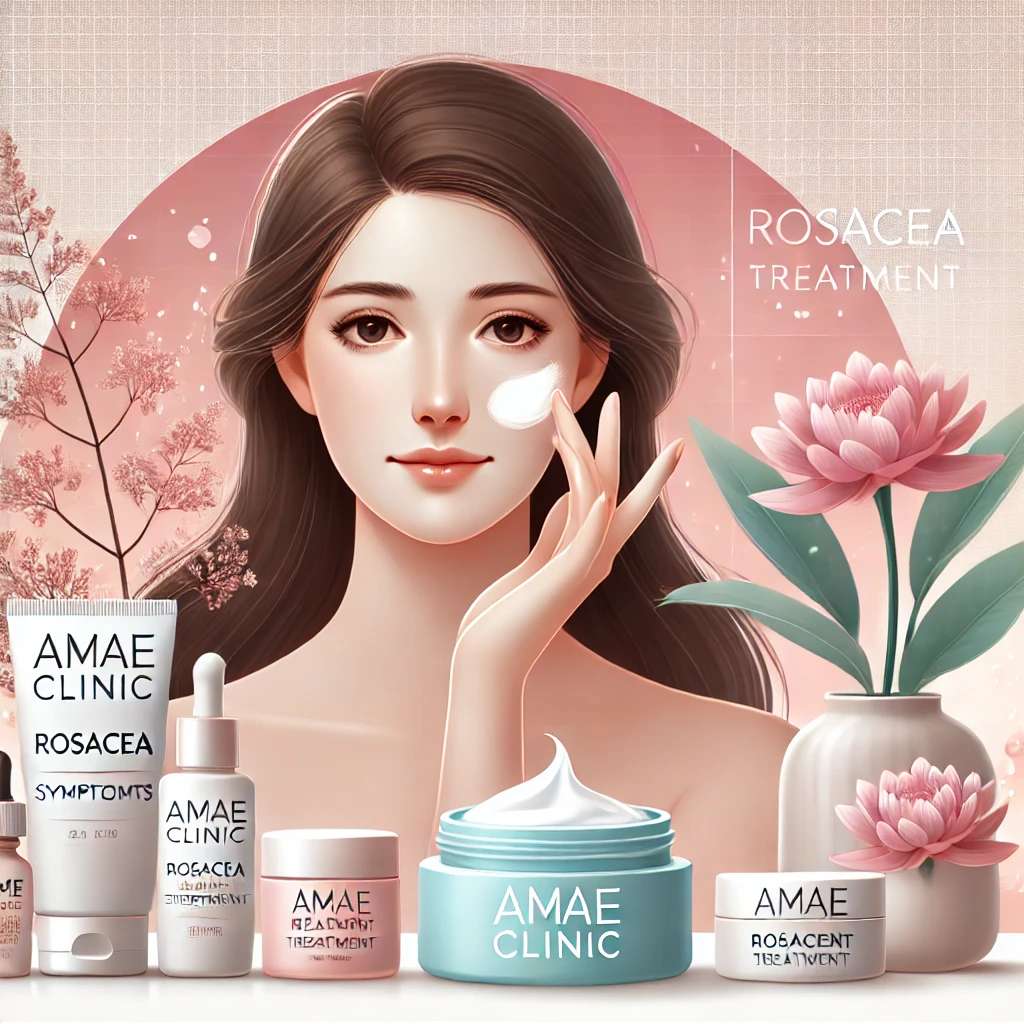At AMAE Clinic, we understand that living with rosacea can be challenging. That’s why we provide effective treatments to help you manage and control your symptoms. Whether you’re experiencing redness, swelling, or flare-ups, our team is here to support you with expert care and personalized solutions.

What is Rosacea?
Rosacea is a long-term skin condition that primarily affects the face, causing redness, visible blood vessels, and sometimes small, red, pus-filled bumps. It commonly appears on the cheeks, nose, forehead, and chin but can also affect the eyes in some cases.
Rosacea Treatments We Offer
Topical Treatments: Creams or Gels
- How They Work: Reduce redness, swelling, and irritation by calming inflamed skin.
- Application: Apply directly to the affected areas.
Oral Antibiotics (Tablets)
- How They Work: Target bacteria and reduce inflammation for more severe symptoms.
- Duration: Issued for short-term use, typically up to 12 weeks.
Included Services ✅
- Prescription for mild to moderate rosacea ✅
- Review of two clear, up-to-date photographs of rosacea ✅
- Treatments for flare-ups of long-term rosacea ✅
- Topical treatments such as creams or gels ✅
- Oral antibiotics prescribed if clinically appropriate ✅
Excluded Services ❌
- Treatment for severe rosacea symptoms ❌
- Treatment for rhinophyma (thickened skin around the nose) ❌
- Treatment for rosacea affecting the eyes or eyelids (ocular rosacea) ❌
- Treatment for other facial skin conditions such as acne or lupus ❌
- Prescriptions for oral retinoids or medications not listed in the questionnaire ❌
- Treatment for pregnant, breastfeeding, or planning-to-conceive patients ❌
How It Works
✨ Here’s How Our Prescription Service Works from the Comfort of Your Home ✨
Requesting a prescription with Amae Clinic is quick, secure, and easy. 🏡💻
Step 1:
Complete a Quick Online Questionnaire
Fill out a short, secure online questionnaire on your phone, tablet, or laptop. It takes only a few minutes to provide us with the information we need.
Step 2:
Medical Review by a Doctor
An Irish-registered doctor will carefully review your details to ensure that this treatment is safe and suitable for you. If additional information is needed, the doctor will contact you via your secure patient account.
Step 3:
Receive Your Prescription
Once approved, your prescription will be sent directly to an Irish pharmacy of your choice via secure Healthmail.
FAQ
This service is ideal for you if:
✅ You are 18 years or older.
✅ You have been diagnosed with inflammatory Rosacea by a doctor in the past (small lumps or spots present).
✅ You have mild to moderate Rosacea symptoms.
✅ You can provide two clear, up-to-date photographs of your Rosacea.
This service is not suitable for you if:
❌ You have not been diagnosed with Rosacea by a doctor in the past.
❌ You are pregnant, planning to conceive, or breastfeeding.
❌ You require a prescription for medications not listed in our questionnaire, including oral retinoids.
❌ You have other facial skin conditions like acne or lupus.
❌ You have severe Rosacea symptoms.
❌ You have Rhinophyma (thickening of the skin around the nose).
❌ Your Rosacea affects your eyes or eyelids (ocular Rosacea).
Important Safety Note:
If you develop eye pain or visual disturbance, it could indicate a serious issue like corneal inflammation. Please seek urgent medical attention.
Rosacea is a common, long-term skin condition primarily affecting the face (cheeks, nose, chin, and forehead). It is most prevalent in adults aged 30–60 with fair skin. The condition is characterized by periods of flare-ups (relapsing) and remissions (settling), which can vary in frequency and severity.
There are different types of Rosacea, each with distinct symptoms:
- Vascular Rosacea:
- Facial redness, flushing, and visible blood vessels (telangiectasia).
- Does not respond to antibiotic treatments.
- Inflammatory Rosacea:
- Lumps or spots that respond well to antibiotic treatments.
- Ocular Rosacea:
- Dry, itchy, burning eyes, and inflammation of the eyelids.
- In severe cases, it may affect the cornea, which is sight-threatening.
The exact cause is unclear, but several factors contribute:
- Overactive immune system.
- Genetic predisposition.
- Environmental factors.
- Demodex folliculorum: A skin mite found in higher numbers on those with Rosacea.
Rosacea is not contagious or caused by poor hygiene.
Here are practical steps to manage your symptoms:
🌞 Wear SPF 30+ daily and avoid direct sunlight.
💧 Use hypoallergenic, non-perfumed moisturizers for dry skin.
🌡 Avoid extreme heat, such as hot showers.
🍷 Limit triggers like alcohol, spicy foods, caffeine, and cheese.
💄 Camouflage creams can help conceal redness—ask your pharmacist for advice.
Although Rosacea is a chronic condition, treatments can effectively manage flare-ups.
Topical Treatments (Creams/Gels):
- Antibiotic: Targets inflammation.
- Anti-mite: Reduces skin mites like Demodex folliculorum.
- Anti-inflammatory: Calms redness and swelling.
Oral Antibiotics (Tetracyclines):
- Prescribed for inflammatory Rosacea to reduce redness and bumps.
- Not effective for vascular Rosacea symptoms like flushing.
- Typically issued for 12 weeks in combination with topical treatments.
- Improvement timeline: 4–12 weeks of consistent use.
- If symptoms worsen or persist beyond 12 weeks, seek a review with a doctor.
- Be sure to disclose any current medications or medical conditions in your questionnaire to ensure safe prescriptions.
- If your symptoms change significantly or new symptoms develop, schedule a face-to-face consultation immediately.